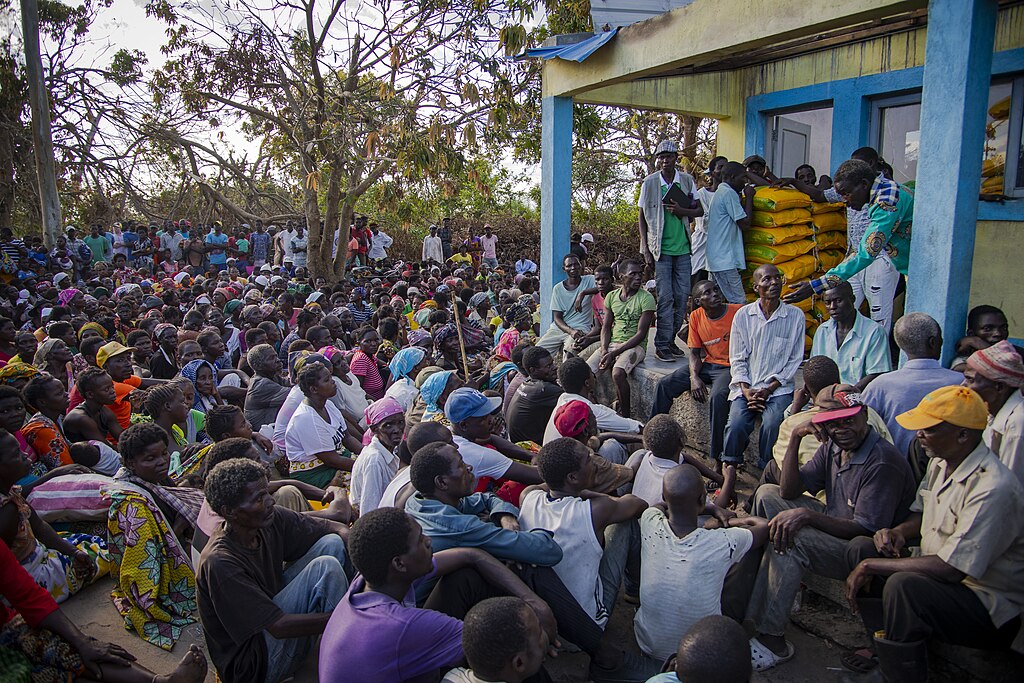The UN reported on Sunday that a new wave of armed attacks in northern Mozambique has forced tens of thousands of people to flee their homes, deepening an already dire humanitarian crisis and raising urgent questions about compliance with international legal obligations to protect civilians and facilitate humanitarian assistance.
Between July 20 and 28, at least 46,667 people were displaced across the districts of Chiúre, Ancuabe, and Muidumbe in Cabo Delgado province, according to the United Nations Office for the Coordination of Humanitarian Affairs (OCHA). The worst-hit area was Chiúre, where more than 42,000 people were uprooted—over half of them children. In total, more than 95,000 people have fled their homes due to insecurity in Cabo Delgado since January.
The displaced are seeking shelter in overcrowded areas such as Bairro Micone and Bairro Namicir in Chiúre Sede. Families who fled attacks in Chiúre Velho, Ocua, and Mazeze now find themselves crammed into makeshift accommodations with little access to food, clean water, or medical care. Humanitarian partners report that separated and unaccompanied children are becoming increasingly common—a stark indicator of how the violence is fracturing families and exposing the most vulnerable to exploitation and abuse.
Further south in the Ancuabe district, the situation deteriorated rapidly. The UN’s International Organization for Migration reported that the number of displaced families nearly tripled in a single week, with 444 households—comprising 1,946 people, including more than 1,200 children—fleeing from villages such as Nanduli to seek refuge in Chiote and Ancuabe Sede. Meanwhile, in Muidumbe, militants reportedly torched homes in Magaia village and opened fire near Mungue, forcing nearly 500 families to flee to temporary displacement sites. Humanitarian access to these areas remains limited due to security concerns and logistical barriers.
International legal frameworks provide clear guidance in situations like this. Mozambique is a State Party to Additional Protocol II of the Geneva Conventions, which governs non-international armed conflicts and prohibits forced displacement of civilians unless absolutely required for their safety or imperative military reasons. Parties to such conflicts must also allow and facilitate rapid and unimpeded humanitarian access to affected populations.
Beyond international humanitarian law, Mozambique has ratified the African Union’s Kampala Convention on the Protection and Assistance of Internally Displaced Persons. The convention obligates governments to protect IDPs from arbitrary displacement, ensure their dignity and safety, and provide access to civil documentation. It also imposes a duty to allow humanitarian organizations access to displaced populations. However, implementation of these commitments remains inconsistent, and reports from the ground suggest that the displaced in Cabo Delgado are struggling to obtain even basic forms of legal recognition and support.
The UN Guiding Principles on Internal Displacement, while not binding, are widely accepted as the normative framework for protecting IDPs. These principles affirm that displaced persons have the right to move freely, access essential services, and be reunited with their families. The presence of unaccompanied minors and widespread lack of identification in Cabo Delgado underscores the urgent need for the Mozambican government and international partners to step up protection measures.
At the same time, the humanitarian response is collapsing under a severe funding shortfall. Mozambique’s 2025 Humanitarian Response Plan is only 19 percent funded. Of the $352 million required, just $66 million has been received as of July, forcing aid agencies to reduce their target population from 1.1 million to 317,000. This reduction, OCHA warns, is placing thousands of people at risk of being left without assistance just as their needs are growing more acute.


